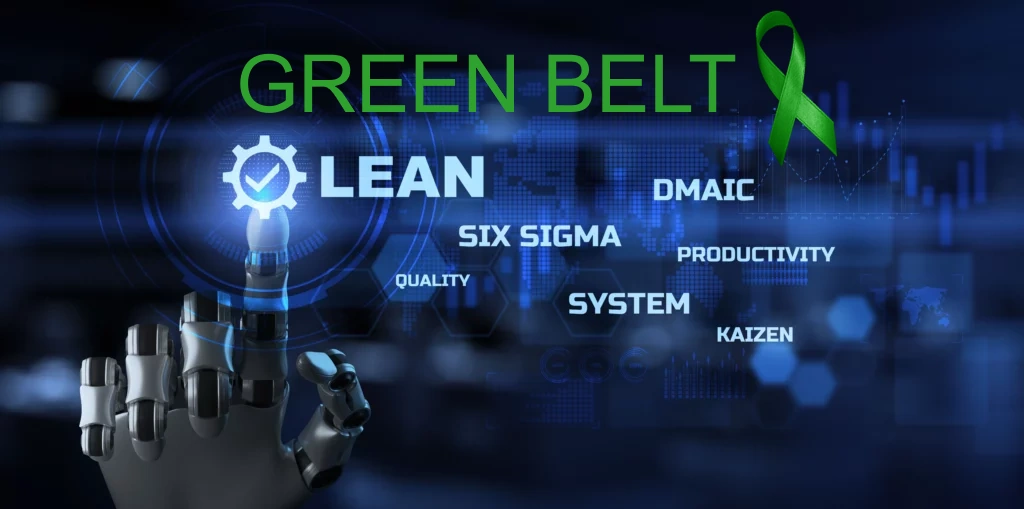Lean Six Sigma Green Belt
Current Status
Price
Get Started
Program Title: Lean Six Sigma Online Green Belt Certification
Duration: 37.5 clock hours
This course provides 37.5 PDUs for eligible PMPs (15-Technical; 15-Leadership; 7.5- Strategic and business)
Program Description The Lean Six Sigma Green Belt Online Certification course is a course for professionals who want to learn the tools of Lean Six Sigma which help drive waste and lost opportunity from business operations. It includes the following elements:
- End-of-Section quizzes are provided to reinforce subject matter content and interactive content exercises provide a deeper review of concepts;
- Students will lead an actual company-based and approved Green Belt-Level improvement project that will directly benefit their organization;
- On the final day of the course, students will present their certification projects and complete a Certification Exam.
Who should take this course?
This course is intended for professionals who wish to learn about the knowledge skills and tools associated with Lean Six Sigma and apply them while leading Green Belt projects. Students will be able to perform value stream mapping exercises and successfully manage corporate continuous improvement projects.
Lean Six Sigma Green Belt Certification Course Syllabus
- Introduction to Lean Six Sigma (What is Lean Six Sigma?)
- Consensus Criteria Prioritization Matrix
- Lean Six Sigma Project Selection
- Common Wastes (TIMWOODS)
- Team Formation
- What is a Process?
- Identify a Lean Six Sigma Improvement Project.
- Complete weekly project work assignments
- Review: What is Value?
- Business Process Management
- Balanced Scorecard
- Using Metrics
- Cost of Quality/Cost of Poor Quality
- Design for Six Sigma (DFSS) (1-10-100 Rule, DFSS Roadmaps)
- Kaizen – “Change for the Better” or “Improvement”
- 5S/6S
- Visual Management
- Standard Work
- Processes and Quality Defects (Poke Yoke)
- Continuous Flow
- Kanban
- Theory of Constraints
- Projects and Teams: Stakeholder Analysis
- Gantt Charts
- Project Risk Analysis and Project Closure
- 7 Management & Planning Tools
- Project Charter (review)
- Team Dynamics & Performance
- RACI (Responsible, Accountable, Consulted, Informed)
- PDCA, DMAIC and other Continuous Improvement Processes
- The DMAIC Process
- The Define Phase
- Deliverables and Activities of the Define Phase
- Define Phase Activities
- Who are our Customers? Identify Customers, Analyze Customer Data
- Gathering Custom VOC/Data
- Establish Project Metrics
- Value Stream / Value Chains
- Customer Expectations, The KANO Satisfaction Model
- Define Phase Action Items, Roadblocks
- Define Phase Summary
- The Measure Phase
- Measure: Purpose and Deliverables, Process Analysis, Process Mapping
- Collecting Data, Data Types, Data Collection, Sampling
- Define Performance Standards, Operational Definition
- Determining Baseline Sigma
- Purpose of Basic Statistics
- Graphical Methods: Pareto, Boxplots, Scatter Diagrams, Histograms, Normal Probability Plots
- Distributions: Normal, Binomial, Poisson
- Introduction to Measurement Systems Analysis or MSA
- The Analyze Phase
- Deliverables of the Analyze Phase: Root Cause
- Statistical Tool Choices: Where / When to Use
- Other Common Root Cause Tools
- Population/Sampling and Hypothesis Testing
- ANOVA (Analysis of Variance)
- Project Work
- The Improve Phase
- Improve Phase Deliverables
- Design of Experiments (DOE)
- (Planning, Full Factorial, Quality Function Deployment (QFD)
- Failure Modes and Effects Analysis
- Calculating Risk Priority Number (RPN)
- The Control Phase
- Control Phase Deliverables
- Statistical Process Control (SPC)
- Process Capability (Cp, Pp, Cpk, Ppk, Cpm)
- Determining Baseline Sigma (review)
- Control Plans
- PDCA, DMAIC and other Continuous Improvement Processes
- Review of Objectives
- A Lean Problem-Solving Process
- Project Work
- Instructor Final Comments/Additional Course Offerings
- Project Presentations
- Course Evaluations
- Lean Six Sigma Certification Exam (80% Min)
- Graduation/Certificate Awards
Why WGA?
WGA has distinguished itself in the market as a training provider that brings real-world experience to the classroom. WGA develops its own proprietary training materials with dedicated curriculum developers and instructors who are also practicing consultants. All instructors of this material have at least 20 years of senior experience managing projects. They have the ability to not only teach but to coach each student as the classes progress. WGA uses quality assurance and quality control as tools of continuous improvement in the training offerings we provide.

